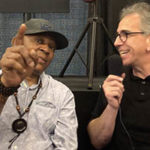Contrary to what we’re taught, there might be something to it
By Jon Liebman
Week of July 27, 2020
As bass players, we’re taught, right from the beginning, to be the loyal, humble servants, dutifully taking care of business, often from the back of the stage.
What’s up with that?!
This week, we published a great interview with Randy George, who just released yet another killer compilation of covers, with Neal Morse and Mike Portnoy. At one point in the conversation, Randy said the bass player should to find a way to stand out.
Really? Doesn’t that fly in the face of everything we’re told about what a bass player “should” be?
“When I was younger,” Randy says, “some of the coolest advice I ever heard from an artist was, ‘Make yourself stand out.’ Good old Bootsy Collins advice. ‘Do something that makes you stand out.’”
Go on, Randy. We’re listening.
“I started wearing really colorful, ornate shirts in the Neal Morse band,” he continues, “because at first, it was like seven, eight people on stage, I’d be in the back. And I don’t know. Prog is known for colorful outfits, so it’s just one of those things.”
So far, I don’t see a problem with what Randy’s saying. Where we get into dangerous territory, though, is when the idea of standing out carries over into how you do your job as a bass player.
In all my instruction, whether it be with my books, private students, or subscribers who are learning bass online at For Bass Players Only, I always drive home the point of understanding what it means to be a bass player, which, traditionally, means playing a supportive role. We lay down the groove, lock in with the drummer, and make the music feel good.
The closest thing to what Randy’s saying is something I heard Nate Watts tell a group of bass players once, which was to “sign it” and put some of yourself into the groove. I like what Nate says, as long as you maintain an appropriate balance and give the music what it needs.
But why would the thought of standing out even come up? Is it an ego thing, or maybe a sign of insecurity?
In some cases, yes, but that’s not where Randy’s coming from. There are a lot of bass players out there, and we all want to be noticed for doing what’s required, and remembered for doing it very well, in our own way.
“You find a way to make yourself stand out,” Randy says, “and just be the best player that you can be, and be willing to listen to other people, and what they’re saying, and try to serve their music without your own ego getting in the way. That’ll go a long way.”
Okay, then. Give it a try, if you’re so moved, and have fun. But be careful and never lose sight of what’s important.
How about you? Have a thought on the subject? Leave a comment below and let me know what you think. In the meantime, you can check out my interview with Randy here.





“I always drive home the point of understanding what it means to be a bass player, which, traditionally, means playing a supportive role.”
Which makes perfect sense if you are playing traditional music. Serve the music and it if means standing out, that’s what you do. Generalizations are like assumptions.
I get what you are saying and I agree that every bass player should be capable of doing the supportive thing (Victor Wooten once sat in with my band. Two bassists at once. He was completely supportive, out of the way, not the flashy Victor we know. It was like he was the missing 5th member of the band and caught all the time signature changes and weird chords, etc. But everyone knows him as being Mr. Flashy). That doesn’t mean that music is so limited that you should never step out. The implication that bassists who do step out aren’t bassing properly (to verb a noun), seems like an unnecessary attack on people who want to go a different way. It’s just an instrument and music is music. In other words, infinite.
Me personally, I LOVE being in the background. As long as the bass and drums are clicking together and the music is grooving, I’m good. But things changed over the years! I guess it depends on the band situation. Now if you’re doing a solo or the solo bass performer, then you SHOULD stand out. Or you’re in the kind of band where EVERYBODY has to do choreography steps, then you stand out. Other than that, nothing wrong with being in the back. Just make that bass swing and locked it in with some killer lines and grooves. To me, I want THOSE to stand out.
I think that the whole notion of assigning a particular instrument a ‘role’ is a big mistake, listen to Dave Hope with Kansas or Verdine White with Earth, Wind and Fire….They’re not ‘flashy’ players by any stretch but they stand out as much as the lead vocal!:-) You hear vocals, bass, guitars then drums and keys. We lost this awesome ‘bass- centric’ sound probably due to some jealous guitar players whining about the ‘role’ of the bass, yuck…along with sound engineers’ falling in love with the kick drum for some idiotic reason….or maybe because players got boring…
I want people to notice when I’m not playing. We breathe every day without giving the air around us a second thought, current pandemic excepted. Take away that air and see how quickly someone notices.
If you’re like everyone else, you’re not being true to yourself. The way you play, your tone, the way you interact with the band is standing out. It’s expected that we as bass players will do our job. However, why would they call you over someone else? Simple, that stand alone thing, (standing out) that makes you different, than the next guy with a bass. After all, we’re a dime three dozen so you better stand out or you won’t get the gig!
I’d say to not worry about whether you are standing out or not as a bass.player, just play the bass part the best you can and enjoy yourself.
For the last 50 years my goal in playing bass is first, make people feel like dancing, when the music calls for that. Second, I play for the one person (or more) in the room who is a bass aficionado who will appreciate my personal style.
Those not into the bass will only notice how good the group sounds.